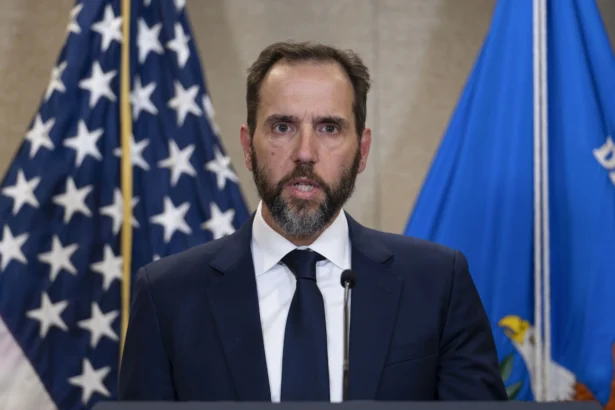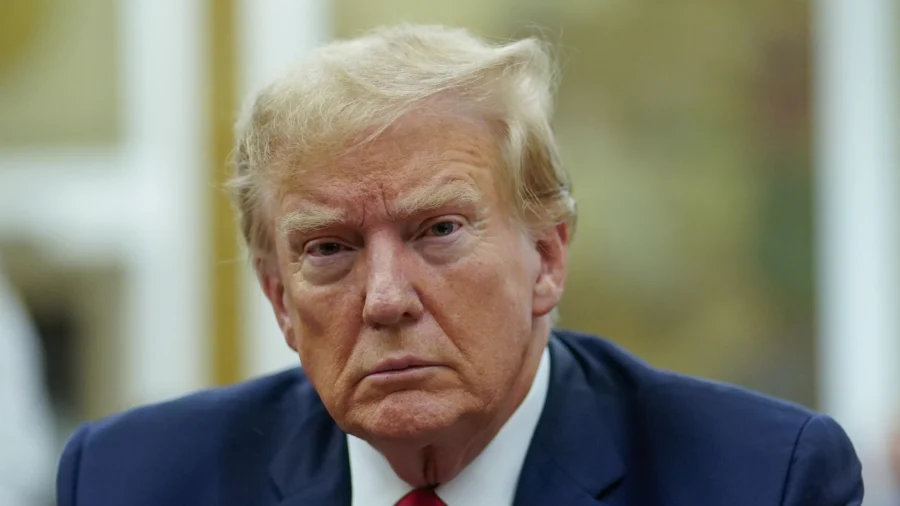Former President Donald Trump is appealing District of Columbia District Judge Tanya Chutkan’s rejection of his motions to dismiss the case for reasons related to his constitutional rights and presidential immunity.
His legal team filed a notice of appeal on Dec. 7, along with a motion to stay proceedings in his D.C. case pending resolution of the appeal in the U.S. Court of Appeal for the D.C. Circuit. “President Trump has appealed the Court’s rulings on his motions to dismiss based on presidential immunity and principles of double jeopardy,” his attorneys wrote in their motion to stay proceedings. “Both issues concern whether this case can be brought at all.”
Judge Chutkan rejected the motions to dismiss on Dec. 1, ruling that presidential immunity didn’t protect former presidents after they left office.
“Defendant’s four-year service as Commander in Chief did not bestow on him the divine right of kings to evade the criminal accountability that governs his fellow citizens,” she said.
Lawyers for President Trump argued in their Oct. 5 motion that his actions following the 2020 election “are within the ambit of his office,” and, therefore, “he is absolutely immune from prosecution.” They contended that, as president, he acted to “ensure election integrity.”
She also dismissed President Trump’s claim that he was unconstitutionally charged twice over the same issue—an argument referring to the Fifth Amendment’s protection against double jeopardy. His attorneys had argued that the Senate had effectively already tried him for the events of Jan. 6, 2021. The House of Representatives had issued an article of impeachment for “Incitement of Insurrection,” but the Senate ultimately failed to garner the votes necessary for a conviction.
“Neither traditional double jeopardy principles nor the Impeachment Judgment Clause provide that a prosecution following impeachment acquittal violates double jeopardy,” Judge Chutkan wrote.
The Impeachment Judgement Clause refers to a portion of Article I, which reads: “Judgment in Cases of Impeachment shall not extend further than to removal from Office, and disqualification to hold and enjoy any Office of honor, Trust or Profit under the United States: but the Party convicted shall nevertheless be liable and subject to Indictment, Trial, Judgment and Punishment, according to Law.”
President Trump’s Oct. 23 motion to dismiss on constitutional grounds argued that because “the Constitution specifies that only ‘the Party convicted’ by trial in the Senate may be ‘liable and subject to Indictment, Trial, Judgment and Punishment’ … it presupposes that a President who is not convicted may not be subject to criminal prosecution.”
The appeal is just the latest in a series of pre-trial battles that have played out in the D.C. case and others against President Trump.
Judge Chutkan prompted a separate appeal when she rejected President Trump’s attempt to remove her hotly debated gag order on him. That case is still pending after oral argument that took place on Nov. 20.
The former president’s legal team has also argued that the D.C. case should be dismissed because it targets his free speech, represents an abuse of the Department of Justice’s statutory authority, and constituted a selective and vindictive prosecution in which Special Counsel Jack Smith served as a “stalking horse” for President Joe Biden.
“The prosecution seeks to install itself as America’s censor, with roving authority to criminally prosecute all who speak out against its approved narratives,” reads a filing from President Trump’s legal team.
“The prosecution has no such mandate. Accordingly, the indictment is unconstitutional on its face and must be dismissed. Additionally, even if the First Amendment permitted charges on this basis—which it emphatically does not—President Trump’s acquittal before the United States Senate forecloses retrial before this Court, as do the Constitution’s guarantees of due process and fair notice.”

In denying President Trump’s motion to dismiss on constitutional grounds, Judge Chutkan previously wrote that the U.S. Constitution doesn’t protect speech “that is used as an instrument of a crime,” which forms part of the allegations in President Trump’s indictment, she noted.
The DOJ has criticized President Trump’s motions to dismiss and similarly attacked his First Amendment claims.
“The allegations that the defendant sought to overturn the results of the 2020 presidential election by resorting to fraud, deceit, and corruption place his conduct well outside the protections afforded by the First Amendment and likewise put him fully on notice that his conduct was criminal and thus subject to prosecution,” the DOJ wrote in a combined opposition to President Trump’s motions to dismiss on statutory and constitutional grounds.
Caden Pearson contributed to this report.
From The Epoch Times

